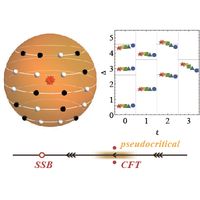SO(5) Deconfined Phase Transition under the Fuzzy-Sphere Microscope: Approximate Conformal Symmetry, Pseudo-Criticality, and Operator Spectrum
IF 11.6
1区 物理与天体物理
Q1 PHYSICS, MULTIDISCIPLINARY
引用次数: 0
Abstract
The deconfined quantum critical point (DQCP) is an example of phase transitions beyond the Landau symmetry-breaking paradigm that attracts wide interest. However, its nature has not been settled after decades of study. In this paper, we apply the recently proposed fuzzy-sphere regularization to study the SO(5) nonlinear sigma model with a topological Wess-Zumino-Witten term, which serves as a dual description of the DQCP with an exact SO(5) symmetry. We demonstrate that the fuzzy sphere functions as a powerful microscope, magnifying and revealing a wealth of crucial information about the DQCP, ultimately paving the way toward its final answer. In particular, through exact diagonalization, we provide clear evidence that the DQCP exhibits approximate conformal symmetry. The evidence includes the existence of a conserved SO(5) symmetry current, a stress tensor, and integer-spaced levels between conformal primaries and their descendants. Most remarkably, we identify 23 primaries and 76 conformal descendants. Furthermore, by examining the renormalization group flow of the lowest symmetry singlet as well as other primaries, we provide numerical evidence in favor of DQCP being pseudo-critical, with the approximate conformal symmetry plausibly emerging from nearby complex fixed points. The primary spectrum we compute also has important implications, including the conclusion that the SO(5) DQCP cannot describe a direct transition from the Néel to valence bond solid phase on the honeycomb lattice.

模糊球显微镜下的 SO(5) 非约束相变:近似共形对称性、伪临界和算子谱
去封闭量子临界点(DQCP)是超越朗道对称破缺范式的相变实例,引起了广泛关注。然而,经过几十年的研究,其本质仍未确定。在本文中,我们应用最近提出的模糊球正则化来研究具有拓扑 Wess-Zumino-Witten 项的 SO(5) 非线性西格玛模型,它是具有精确 SO(5) 对称性的 DQCP 的双重描述。我们证明,模糊球就像一个功能强大的显微镜,放大并揭示了有关 DQCP 的大量关键信息,最终为找到其最终答案铺平了道路。特别是,通过精确对角化,我们提供了 DQCP 显示近似保角对称性的明确证据。这些证据包括一个守恒的 SO(5) 对称电流、一个应力张量以及共形基元和它们的后代之间的整数间隔水平的存在。最引人注目的是,我们发现了 23 个基元和 76 个共形后裔。此外,通过研究最低对称单子和其他基元的重正化群流,我们提供了支持 DQCP 为伪临界的数值证据,近似共形对称可能来自附近的复定点。我们计算的基元谱也具有重要意义,包括 SO(5) DQCP 无法描述蜂巢晶格上从内尔固相直接过渡到价键固相的结论。
本文章由计算机程序翻译,如有差异,请以英文原文为准。
求助全文
约1分钟内获得全文
求助全文
来源期刊

Physical Review X
PHYSICS, MULTIDISCIPLINARY-
CiteScore
24.60
自引率
1.60%
发文量
197
审稿时长
3 months
期刊介绍:
Physical Review X (PRX) stands as an exclusively online, fully open-access journal, emphasizing innovation, quality, and enduring impact in the scientific content it disseminates. Devoted to showcasing a curated selection of papers from pure, applied, and interdisciplinary physics, PRX aims to feature work with the potential to shape current and future research while leaving a lasting and profound impact in their respective fields. Encompassing the entire spectrum of physics subject areas, PRX places a special focus on groundbreaking interdisciplinary research with broad-reaching influence.
 求助内容:
求助内容: 应助结果提醒方式:
应助结果提醒方式:


